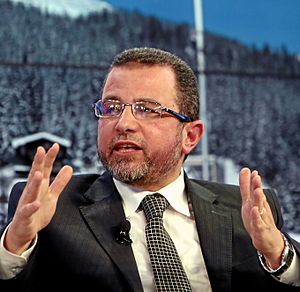Hesham Qandil facts for kids
Quick facts for kids
Hesham Qandil
|
|
|---|---|
|
هشام قنديل
|
|

Qandil in 2013
|
|
| 51st Prime Minister of Egypt | |
| In office 2 August 2012 – 8 July 2013 |
|
| President | Mohamed Morsi |
| Deputy | Mohamed Kamel Amr |
| Preceded by | Kamal Ganzouri |
| Succeeded by | Hazem El Beblawi (Acting) |
| Minister of Water Resources and Irrigation | |
| In office 21 July 2011 – 2 August 2012 |
|
| Prime Minister | Essam Sharaf Kamal Ganzouri |
| Preceded by | Hussien Ehsan Al-Atfy |
| Succeeded by | Mohamed Bahaa Eldin |
| Personal details | |
| Born |
Hesham Mohamed Qandil
17 September 1962 Beni Suef, United Arab Republic (present-day Egypt) |
| Political party | Independent |
| Alma mater | Cairo University (BS) Utah State University (MS) North Carolina State University (PhD) |
Hesham Mohamed Qandil (born 17 September 1962) is an Egyptian engineer and government official. He served as the prime minister of Egypt from 2012 to 2013. President Mohamed Morsi chose Qandil to be prime minister on 24 July 2012. He officially started his role on 2 August 2012. Before this, Qandil was the Minister of Water Resources and Irrigation from 2011 to 2012.
News reports said that Qandil was an independent public servant. He was not widely expected to become prime minister. He was the youngest prime minister in Egypt since Gamal Abdel Nasser in 1954. When President Morsi's government changed in 2013, Qandil first stayed on. However, he resigned on 8 July 2013. This was in protest after a sad event where people were hurt during protests near the Republican Guard headquarters. He was briefly held in December 2013. He was released in July 2014 after a court cleared him.
Contents
Early Life and Education
Hesham Qandil was born in 1962. He studied engineering at Cairo University, earning his first degree in 1984. He then went to Utah State University in the United States. There, he earned a master's degree in irrigation and drainage engineering in 1988. Later, he received his PhD from North Carolina State University in 1993. His PhD was in biological and agricultural engineering, focusing on water resources.
Career in Water Resources
After finishing his studies, Qandil began working for the Egyptian government in 1985. He joined the department that manages water resources. In 1995, he received a special award from the president for his work in irrigation. From 1999 to 2005, he worked as an office director for the Minister of Water Resources.
He also took part in important international projects. He helped with the Nile Basin Initiative, which works on water issues for countries along the Nile River. He was also a leader in water resources at the African Development Bank for about six years. He returned to Egypt in 2011 after the revolution. He became the Minister of Water Resources and Irrigation in Prime Minister Essam Sharaf's government.
Prime Minister of Egypt
On 24 July 2012, President Mohamed Morsi chose Hesham Qandil to be the new prime minister. Many people were surprised by this choice. On 2 August 2012, the new government, called the Egyptian cabinet, officially started. It included many experts and some members from political parties.
First Government Team
Qandil's first government team had 35 ministers. These ministers included experts in different fields. Some members also came from political parties like the Freedom and Justice Party, the Al-Wasat Party, and the Renaissance Party.
Changes to the Government Team
On 6 January 2013, ten ministers in Qandil's government were changed. This included new ministers for finance, transportation, and the interior. After these changes, more members from the Freedom and Justice Party joined the government team.
Ministers Resign
On 1 July 2013, several ministers decided to leave the government. These included the tourism minister, the communications minister, and the foreign minister. The sports minister also resigned the next day.
Leaving Office
On 3 July 2013, a court ruling affected Qandil's position. On the same day, President Morsi was removed from office. On 8 July 2013, Prime Minister Qandil resigned. He did this in protest after a sad event where many people were hurt during protests. He had initially planned to stay on as a temporary leader. In December 2013, he was briefly held. However, in July 2014, a higher court accepted his appeal. The court cancelled the previous ruling against him. He was then released on 15 July 2014.
Personal Life
Hesham Qandil is married and has five daughters.
See also
 In Spanish: Hesham Qandil para niños
In Spanish: Hesham Qandil para niños

